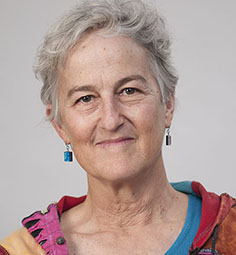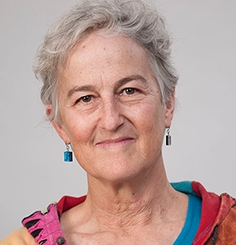PERI ECONOMIST INTERVIEW SERIES
Nancy Folbre
This is part of PERI's economist interview series, hosted by C.J. Polychroniou.
Read Nancy's bio here.

C.J. Polychroniou: As undergraduate student, you majored in philosophy, then went on to get an MA in Latin American Studies, but eventually ended up pursuing a doctorate degree in economics at the University of Massachusetts Amherst. What made you switch to economics, and why did you choose to study at UMass-Amherst?
Nancy Folbre: I thought economics was a key to understanding things in the world that most troubled me. I came to study at UMass Amherst because Paul Sweezy befriended me while on a visit to the University of Texas, and told me about the program. I knew immediately that it was where I wanted to be.
CJP: Who are the economists that influenced you the most?
NF: Paul Sweezy was the first. My Ph.D. advisors Sam Bowles and Jane Humphries had a big impact on my thinking, and, as I started engaging more with feminist theory, Heidi Hartmann, Barbara Bergmann and Diane Elson. Robert Pollak’s and Shelly Lundberg’s ideas about family bargaining influenced me, along with Amartya Sen’s emphasis on human capabilities. I’ve learned important things from many others involved with the International Association for Feminist Economics and the Union for Radical Political Economy.
CJP: You are one of the pioneering economists in the area of feminist economics. What is the paradigmatic framework behind feminist economics, and how has the discipline evolved since you helped institutionalize it?
NF: Feminist economists are diverse, and I can’t speak for all of them. Here’s how I boil down my own socialist feminist perspective. Women have some collective interests as women. The reproductive work of caring for others is productive. This work reveals the limits of individual self-interest as a principle for organizing economic life. The principle of “every man for himself” is a recipe for extinction. My views (and those of many other feminist economists) have evolved pretty steadily toward an intersectional analysis that emphasizes the interplay among inequalities based on gender, sexuality, race/ethnicity, class, and citizenship.
CJP: Your work has focused extensively on the patriarchal mode of production. What’s the relationship between capitalism and patriarchy, and how do they jointly reinforce gender inequality?
NF: I once wrote a paper about the patriarchal mode of production, but I haven’t used that terminology for a long time. “Mode of production” implies one particular form of surplus extraction, and I argue, instead, that many forms of exploitation take place simultaneously. The resulting social divisions help stabilize capitalist structures of collective power, but also have their own economic dynamics. This approach highlights the need to develop coalitions among disempowered groups and to re-imagine socialist institutions.
CJP: Are feminist perspectives on work, care, and the commodification of life in general intrinsically linked to a socialist vision of society? In other words, do feminist economics and socialism go hand-in-hand?
NF: The answer to this question depends on what the socialist vision is, as well as which feminist economics you are talking about. I am a socialist feminist because I believe that economic justice, solidarity, and sustainability are important goals for everyone, including women.
CJP: Another topic that has received ample attention in your research is that of unpaid care work. How does unpaid work affect women, the economy and society at large, and what policy solutions do you recommend for unpaid labor contributions?
NF: Unpaid work is a big part of the economy, and we need to recognize it more fully and redistribute it more equitably. This requires some renegotiation of the gender division of labor in personal and family life, and also greater public support for the work of caring for others. We need increased investment in the provision of health care, education, childcare, and elder care as well as a basic minimum income. We also need more creative thinking about institutional designs that give both care workers and care recipients voice and choice.
CJP: One of your books is titled Greed, Lust & Gender: A History of Economic Ideas. One can see how greed is reinforced through economics. But what is the connection between greed and lust in capitalist economic life?
NF: There’s a long and gendered intellectual history to the justification of greed. Men were given cultural permission to be self-interested long before women were. Economic success is still culturally coded as “unfeminine.” Likewise, double standards of sexual behavior are still applied to women and men. Traditional definitions of masculinity and femininity are an obstacle to the development of a more cooperative society.
CJP: Your latest book, The Rise and Decline of Patriarchal Systems, is slated to appear in early 2021. What is it all about?
NF: The subtitle of the book is “An Intersectional Political Economy,” and the first five chapters elaborate many of the points above. The second five revisit some historical themes of political economy, including the origins of patriarchal institutions, the transition to capitalism, and the role of the welfare state, with particular attention to the complexity of collective conflict.



